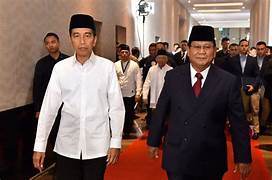Jokowi, often dubbed the “Infrastructure President” due to his enthusiasm for toll roads and dams, claims that 80% of the work in Nusantara is complete, with the city set to be ready for occupation by September. Indonesia is constructing a new capital in East Kalimantan because Jakarta is steadily sinking.
This ambitious project aims to shift the capital and create a green, sustainable city. However, numerous corruption allegations have surfaced against the leaders involved in the initiative. Additionally, the unexpected resignation of two key leaders has raised significant concerns about the credibility and future of this endeavor. Jokowi is racing to finish the project before Subianto assumes office and potentially makes alterations. The urgency in Jokowi’s efforts underscores the political and logistical challenges facing the successful completion of Nusantara.
President Joko “Jokowi” Widodo recently announced his intention to begin working from Indonesia’s new capital, Nusantara, starting next month. This move seeks to address growing concerns about the project’s future following the unexpected resignations of the top two officials overseeing its construction. Jokowi confirmed that the city’s official inauguration will take place during Indonesia’s Independence Day celebrations in August. He also mentioned that he would commence working from the new presidential palace as soon as the water supply is connected, which is expected to be ready by July, which has been facing issues for quite some time.
During his visit to Nusantara, Jokowi expressed optimism about the progress of the new office. He inaugurated several construction projects, including a water reservoir, and attended ceremonies for schools and universities. Nusantara is located in the hills of East Kalimantan, approximately 1,300 kilometers from Jakarta. The decision to relocate the capital stems from Jakarta’s significant challenges, such as overcrowding, pollution, and the city’s rapid sinking due to excessive groundwater extraction.
The Nusantara project aims to create a smart, green city that aims to utilize renewable energy sources. Construction of the city began in mid-2022. However, the recent resignations of Bambang Susantono, head of the Nusantara Capital Authority (OIKN), and his deputy Dhony Rahajoe have raised questions about the project’s viability and direction. These resignations have added to the concerns about the project’s future, especially as Jokowi’s term ends in October.
Jokowi is eager to complete as much of the work as possible before his term concludes to avoid potential alterations by his successor, President-elect Prabowo Subianto. The Indonesian government has faced difficulties in attracting private investment for the project, which is estimated to cost $32 billion, fund problem will increase more under Subianto. Despite some construction delays, Jokowi remains committed to advancing the project.
President-elect Prabowo Subianto, who has promised to continue the project, can make changes to its scope and design. Prabowo, a former military general, ran against Jokowi in the 2014 and 2019 presidential elections but lost both times. He later joined Jokowi’s cabinet as defense minister, a move that some see as Jokowi’s strategy to maintain influence after his presidency. Prabowo’s vice-presidential candidate is Jokowi’s eldest son, Gibran Rakabuming Raka, which further cements the political alliance.
Jokowi appears determined to see the project through under his guidance to ensure his vision is realized and to claim full credit for the initiative. He is concerned that Prabowo might restructure the project significantly, which could shift public praise towards the new administration. Prabowo’s proposed budget for Nusantara is also notably lower than that of Jokowi’s administration, which disbursed $1.8 billion in 2023 and set a budget ceiling of $2.8 billion for 2024.
Ultimately, Prabowo faces the complex task of balancing his policy ambitions with fiscal realities. While it remains uncertain whether Prabowo will prioritize developing Nusantara with the same enthusiasm as Jokowi, the allocated state budget up to 2030 will ensure at least gradual development of the new capital. For Jokowi, the stakes are high. He needs to ensure that the policies and frameworks he has established for Nusantara do not undergo significant changes under Prabowo’s leadership. Jokowi’s vision for Nusantara includes not just the physical infrastructure but also a commitment to renewable energy, sustainable practices, and innovative urban planning.
In conclusion, the development of Nusantara represents a significant and multifaceted challenge for both Jokowi and Prabowo. As Indonesia navigates this transition, the leadership’s ability to manage these complexities will determine the future of the nation’s new capital and its broader developmental trajectory.
